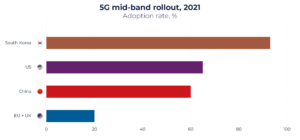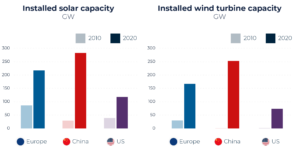ERT highlights the gap between EU visions and realities as geopolitics puts competitiveness in the spotlight
BRUSSELS, 15 June 2022: At the Competitive Europe Summit in Brussels today, Dr Martin Brudermüller, Chair of ERT’s Committee for Competitiveness & Innovation and Chairman & CEO of BASF SE, announced ERT’s latest report, Benchmarking European Competitiveness and Industry.
The report sheds light on the EU’s position compared to other world regions across 64 different key performance indicators (KPIs) within five distinct themes, including critical infrastructure, innovation, the twin transitions and international trade.
1
Among the findings in the new report, in the last 15 years, Europe’s share in Fortune Global 500 companies has roughly halved.
When it comes to the twin digital and energy transitions, the latest data in the report sounds the alarm anew, especially on the rollout of 5G. Fibre connections underpin the uptake of new tools – including for industrial production – and innovation in our hyper-connected world, yet within the EU, progress towards building key digital infrastructure is still too slow, compared to other regions. Without this infrastructure Europe will struggle to remain a leader in industrial production.

At this vital moment in energy geopolitics, it has also become apparent that the construction of essential energy infrastructure is moving too slowly, including in the renewables sector where the EU seeks to be a world leader.

The report also indicates that for now, the EU is holding its ground in exports and in high technology manufactured goods. Yet, it cautions that without increased investment in innovation and R&D, the bloc will lose pace with international peers.

2
With its 60-strong membership of CEOs and Chairs of some of Europe’s most significant industrial and technology companies operating worldwide, ERT is well-placed to assess and review Europe’s competitive place in the world, vis-à-vis other regions.
This report is the latest release in a drumbeat of regular calls by ERT for policymakers to be more attentive to the EU’s competitiveness and to strengthen Europe’s place in the world.
The full report – containing 64 KPIs each with observations and recommendations is now available here.
ENDS
Note to Editors:
More information on the Competitive Europe Summit is available here.
A full list of the Membership of ERT is accessible here.
Since our last report 3 years ago, the world has entered a moment of fundamental change. Geopolitical developments have become immensely important and challenge Europe’s security and future prosperity. We are entering a time of a more divided world – and we have to do that on a strong footing. The EU sees itself as a leader in competitiveness, and a pioneer in advancing the green and digital transitions. Yet today’s report highlights a remarkable disconnect between those goals and the speed at which we are reaching them. More than that, it shows us how far ahead some others are. Taking our competitiveness for granted is a big mistake – unless we improve on key aspects – and do so fast – future generations’ prosperity is at risk.
One thing the EU is not short of, is ambitious ideas – the green & digital transitions, the Fit for 55 climate targets, the EU Chips Act. These are all promising visions. To make them a reality, companies big & small, European, national & regional policymakers and authorities and wider European society must be fully aware that globally we are in competition with other regions. It all comes back to how we pursue our own competitiveness and draw on our strengths. We have to pull together as a team, investing political capital in finally completing the Single Market and doubling down on investment in key infrastructures, R&D and innovation.